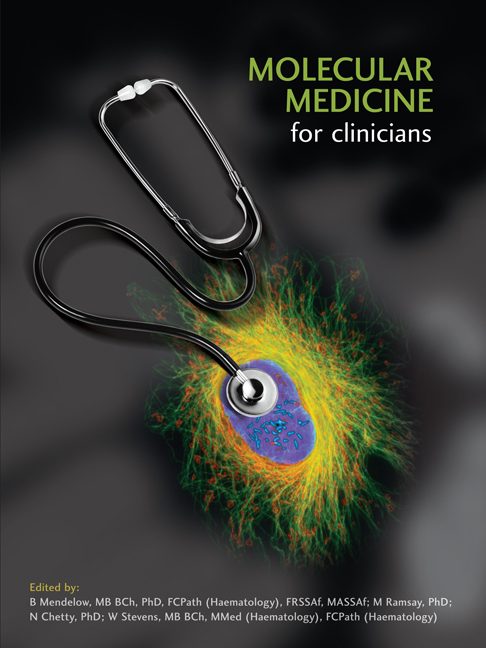Book contents
- Frontmatter
- Contents
- Foreword
- Acknowledgements
- Chapter 1 Introduction
- Keynote Essay 1: Defining Who We Are: DNA in Forensics, Genealogy and Human Origins
- Section 1 Principles Of Cellular And Molecular Biology
- SECTION 2 MOLECULAR PATHOLOGY
- Chapter 8 Genomes and the Environment: An Overview of Molecular Pathology
- Chapter 9 Genetics, Genomics, Health and Disease: General Considerations
- Chapter 10 Chromosome Disorders
- Chapter 11 Mendelian Inheritance
- Chapter 12 Unusual Molecular Processes that Impact on Disease
- Chapter 13 Population Genetics
- Chapter 14 Complex Multifactorial Inheritance
- Chapter 15 Molecular Basis for Phenotypic Variation
- Chapter 16 Medical Genetics
- Keynote Essay 3: Human Cloning: Should We Go There?
- Chapter 17 Neoplasia: General Considerations
- Chapter 18 Oncogenes
- Chapter 19 Mammalian DNA Repair
- Chapter 20 Tumour Suppressor Genes and Inherited Susceptibility to Cancer
- Chapter 21 Carcinoma
- Chapter 22 Leukaemias and Lymphomas
- Chapter 23 Molecular Approaches to the Diagnosis, Prognostication and Monitoring of Cancer
- Keynote Essay 4: Microbes, Molecules, Maladies and Man
- Chapter 24 Molecular Basis of Infectious Diseases: General Considerations
- Chapter 25 Immunology
- Chapter 26 Human Immunodeficiency Virus
- Chapter 27 Tuberculosis
- Chapter 28 Malaria
- Chapter 29 Influenza
- Chapter 30 Oncogenic Viruses
- Chapter 31 Vaccines and Immunisation
- Keynote Essay 5: Drugs and the 21st Century
- SECTION 3 MOLECULAR THERAPEUTICS
- SECTION 4 RESEARCH AND THE CONTINUING EVOLUTION OF MOLECULAR MEDICINE
- Glossary
- Contributors’ Biographies
- Source Material And Recommended Reading
- Permissions And Credits
- Index
Keynote Essay 3: Human Cloning: Should We Go There?
from SECTION 2 - MOLECULAR PATHOLOGY
Published online by Cambridge University Press: 04 June 2019
- Frontmatter
- Contents
- Foreword
- Acknowledgements
- Chapter 1 Introduction
- Keynote Essay 1: Defining Who We Are: DNA in Forensics, Genealogy and Human Origins
- Section 1 Principles Of Cellular And Molecular Biology
- SECTION 2 MOLECULAR PATHOLOGY
- Chapter 8 Genomes and the Environment: An Overview of Molecular Pathology
- Chapter 9 Genetics, Genomics, Health and Disease: General Considerations
- Chapter 10 Chromosome Disorders
- Chapter 11 Mendelian Inheritance
- Chapter 12 Unusual Molecular Processes that Impact on Disease
- Chapter 13 Population Genetics
- Chapter 14 Complex Multifactorial Inheritance
- Chapter 15 Molecular Basis for Phenotypic Variation
- Chapter 16 Medical Genetics
- Keynote Essay 3: Human Cloning: Should We Go There?
- Chapter 17 Neoplasia: General Considerations
- Chapter 18 Oncogenes
- Chapter 19 Mammalian DNA Repair
- Chapter 20 Tumour Suppressor Genes and Inherited Susceptibility to Cancer
- Chapter 21 Carcinoma
- Chapter 22 Leukaemias and Lymphomas
- Chapter 23 Molecular Approaches to the Diagnosis, Prognostication and Monitoring of Cancer
- Keynote Essay 4: Microbes, Molecules, Maladies and Man
- Chapter 24 Molecular Basis of Infectious Diseases: General Considerations
- Chapter 25 Immunology
- Chapter 26 Human Immunodeficiency Virus
- Chapter 27 Tuberculosis
- Chapter 28 Malaria
- Chapter 29 Influenza
- Chapter 30 Oncogenic Viruses
- Chapter 31 Vaccines and Immunisation
- Keynote Essay 5: Drugs and the 21st Century
- SECTION 3 MOLECULAR THERAPEUTICS
- SECTION 4 RESEARCH AND THE CONTINUING EVOLUTION OF MOLECULAR MEDICINE
- Glossary
- Contributors’ Biographies
- Source Material And Recommended Reading
- Permissions And Credits
- Index
Summary
INTRODUCTION
About 13 000 years ago the human species, in what is today Turkey, took a bold step away from the natural practice of hunting and gathering for food, along the pathway towards the modern miracle of agriculture. It started with the unnatural selection of a species of grass with nutritional and utilitarian characteristics that were desirable for humans. The consequences of this massive technological leap have been reverberating ever since. Although its significance was certainly not evident at the time, this first step involved the deliberate, planned large-scale modification of the environment for the benefit of Homo sapiens, and indirectly a handful of other animal and plant species of immediate value to the human architects of this change, and to the disadvantage of virtually all other species. Other technological innovations have continued along this road, and modern debates concerning environmental degradation, genetically modified crops, nuclear technologies and global warming should all ask the question, ‘Should we have started along the road of technological progress at all, those 13 000 years ago?’ Once on this pathway, experience has shown that further progress(ion) is cumulative and unstoppable, simply because the benefits for humans, or at least for the vast majority of them, are undeniable. Given the limited natural ecological carrying capacity of the unmodified environment, a hunter-gatherer mode of existence was arguably capable of supporting a few hundreds of thousands of humans world - wide, perhaps even a few million, so the additional six billion or so humans alive today owe their very existence to technological progress. Sadly but not surprisingly, the rest of the biosphere has fared rather less well than this new growth that has emerged in its midst.
Today, humankind is poised at the brim of another possibly massive step in human development – the deliberate, planned modification of the human species itself by unnatural selection. The consequences for the bio sphere and humankind itself could exceed even those of that earlier step, 13 000 years ago. Should we go there?
- Type
- Chapter
- Information
- Molecular Medicine for Clinicians , pp. 203 - 207Publisher: Wits University PressPrint publication year: 2008



